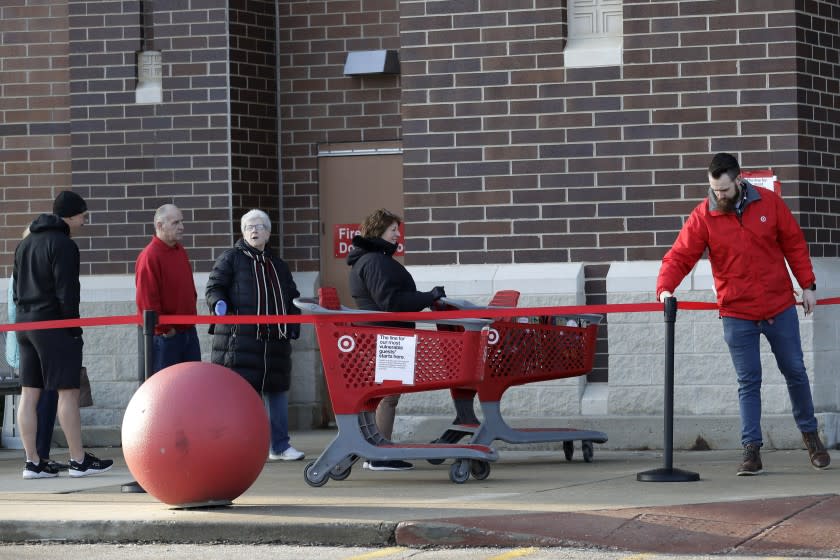Target's Shipt grocery delivery workers push for more coronavirus protections and pay

Some workers for Target Corp.'s grocery delivery app Shipt aren't taking jobs Tuesday, protesting what they see as inadequate safety measures and pay for the risks they shoulder by working during the coronavirus outbreak. It's the latest in a string of walkouts and sick-outs by frequently low-paid workers whose jobs are now deemed essential.
Grocery services are in high demand as people avoid visiting stores for fear of contracting or spreading the coronavirus. Shipt users can order groceries and household items from Target and some other retail chains, including CVS, Petco and Costco, and the app's team of independent contractors go to the stores, do the shopping and deliver the items.
Fear among workers about personal protective equipment mounted over the weekend. On Saturday, the coordinator of the White House's coronavirus task force urged the public to go out only for essential needs. "This is the moment to not be going to the grocery store," Dr. Deborah Birx said.
Leaders of the Shipt protest said in a blog post Monday that they want workers to get hazard pay of $5 per order, more personal protective equipment, a more transparent pay structure and two weeks of paid sick leave if they are "too high risk to work" or have a doctor's note advising them to stay home, regardless of whether they have tested positive for the virus.
Several Shipt delivery workers said the company's transition from a commission-based model to a new pay algorithm has significantly decreased their earnings. They are advocating for a return to the commission-based model. The company additionally cut pay on canceled orders beginning last week, prompting complaints from workers, the Hill reported.
Shipt sent an email Friday night to workers who go into stores and assemble customers' orders, saying it would provide them with gloves and face masks within two weeks. The notice came on the heels of guidance issued Friday by the Centers for Disease Control and Prevention recommending the use of face coverings in areas with community spread of the coronavirus.
"We've been yelling about this for weeks, and to get that email on Friday that we may have to wait another two weeks? ... That was honestly one of the biggest slaps in the face," said Willy Solis, a Shipt delivery worker in Dallas who helped organize Tuesday's action.
Some workers looked to procure protective equipment on their own.
"Hi I would like to ask if anyone in the area of Sherman oaks or van nuys has any extra masks they could donate to me or I could purchase in order for me to continue to work," one person posted Sunday in a Facebook group for Shipt workers.
Kelly Caruso, Shipt's chief executive, said in a blog post Tuesday that the company will provide workers with gloves and masks "through pick-up at their local Target store in the coming weeks." She added that Shipt was issuing bonuses and expediting individual safety kits with gloves and hand sanitizer for the most active workers.
Workers who completed 50 or more orders in March will receive bonuses of $100, and those who completed 100 or more will receive $200, Target spokesman Joe Poulos said. Bonuses will be paid out Friday, he said.
"It's unfortunate that a very small number of people were communicating there was this big strike. That may have prevented people from ordering medication or food they might not be able to get without a service like Shipt," Poulos said. "Today was another day of record volumes.... For people to say there was a walkout really isn't accurate, because we were able to serve customer demand at very high levels today."
It's unclear how many people participated in Tuesday's work stoppage. Solis said the idea had gathered support in Shipt worker Facebook groups, but people fear retaliation from the company and don't want to lose work, especially in a precarious economy.
He said he and other organizers drew inspiration from recent activism among essential workers elsewhere.
Last week, workers at grocery delivery start-up Instacart stayed off the job and Whole Foods employees called in sick in an effort to press the companies for higher pay, paid leave and more sanitation supplies. Workers at several Amazon warehouses have walked off the job. Nurses in the Bronx in New York and sanitation employees in Pittsburgh have protested over a lack of protective gear such as gloves and masks.

